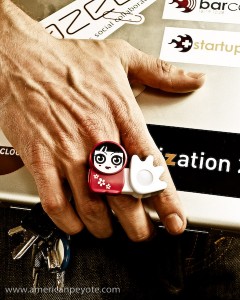 “Do you Poken?” It’s a respectable question, not one you hear every day, but it was a tagline floating around the room at the First Swiss StartUp Camp in Basel. I walked in and was greeted by smiles from the organizers, they handed me my badge and T-shirt and then my eyes fell upon a table filled with cool little…things. I walked up to investigate and was greeted by a smiling Stephane Doutriaux (Poken founder & CEO). “Do You Poken?” he asks me. I admitted that I didn’t, and that I had no real clue what he was talking about. “Do I Poken?” “Poken Sie?” It sounds like one of those random German verbs I don’t know how to conjugate, or a spinoff of Pokemon. Turns out Poken is actually the bridge we’ve been looking for in a cluster-fucked-new-social-network-every-other-week Web 2.0 internet world. The purpose of Poken is to solve a simple problem (the aim of many great startups). It facilitates the transfer of social bookmark information from one person to another when they meet in real life. Because, what usually happens? You meet someone, somewhere at a party, you might exchange phone numbers or email addresses, but often you say something like, “cool, I’ll look you up on Facebook.” And then what happens? You find that there are like 1000 people on Facebook with the same name living in the same geographic region. Too many of them don’t have photos and at this point the best option is to start sending out random friend requests to find one person. Poken essentially eliminates this communication cluster-fuck by transferring your contact on to a Poken device.
“Do you Poken?” It’s a respectable question, not one you hear every day, but it was a tagline floating around the room at the First Swiss StartUp Camp in Basel. I walked in and was greeted by smiles from the organizers, they handed me my badge and T-shirt and then my eyes fell upon a table filled with cool little…things. I walked up to investigate and was greeted by a smiling Stephane Doutriaux (Poken founder & CEO). “Do You Poken?” he asks me. I admitted that I didn’t, and that I had no real clue what he was talking about. “Do I Poken?” “Poken Sie?” It sounds like one of those random German verbs I don’t know how to conjugate, or a spinoff of Pokemon. Turns out Poken is actually the bridge we’ve been looking for in a cluster-fucked-new-social-network-every-other-week Web 2.0 internet world. The purpose of Poken is to solve a simple problem (the aim of many great startups). It facilitates the transfer of social bookmark information from one person to another when they meet in real life. Because, what usually happens? You meet someone, somewhere at a party, you might exchange phone numbers or email addresses, but often you say something like, “cool, I’ll look you up on Facebook.” And then what happens? You find that there are like 1000 people on Facebook with the same name living in the same geographic region. Too many of them don’t have photos and at this point the best option is to start sending out random friend requests to find one person. Poken essentially eliminates this communication cluster-fuck by transferring your contact on to a Poken device.
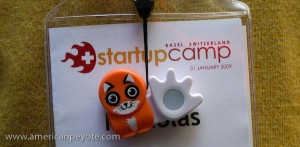
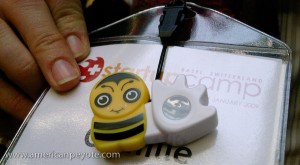 Here’s the deal. You meet someone, say at the first Swiss StartUp Camp in Basel. You decide this person is pretty cool and that you’d like to have their contact info, so you pull out your Poken. You touch your Poken to their Poken, a little green light illuminates on both device…and that’s it. If the light is red, it means it didn’t work and you try again. Now, you head back to your place after meeting a ton of people and plug your Poken into the USB port on your computer. You open the link to the Poken main webpage (which pops up on the drive of the Poken), after registering (takes 5 minutes) all the people you “Pokened” are listed. Or rather, the devices are listed. If the person you met hasn’t registered with Poken and associated their contact information, then obviously you can’t get in touch with them. Poken records the device contact, but all the actual contact information is saved on the Poken webpage. But, basically after getting Pokened you have the contact information and all is good in the world. When you register with Poken you’re basically linking your social networks like Flickr, Facebook, Xing, etc. to your Poken account. So when I look at my contacts on the Poken page, I have direct links to all the networks they’ve associated with their Poken account, simple, perfect, Poken.
Here’s the deal. You meet someone, say at the first Swiss StartUp Camp in Basel. You decide this person is pretty cool and that you’d like to have their contact info, so you pull out your Poken. You touch your Poken to their Poken, a little green light illuminates on both device…and that’s it. If the light is red, it means it didn’t work and you try again. Now, you head back to your place after meeting a ton of people and plug your Poken into the USB port on your computer. You open the link to the Poken main webpage (which pops up on the drive of the Poken), after registering (takes 5 minutes) all the people you “Pokened” are listed. Or rather, the devices are listed. If the person you met hasn’t registered with Poken and associated their contact information, then obviously you can’t get in touch with them. Poken records the device contact, but all the actual contact information is saved on the Poken webpage. But, basically after getting Pokened you have the contact information and all is good in the world. When you register with Poken you’re basically linking your social networks like Flickr, Facebook, Xing, etc. to your Poken account. So when I look at my contacts on the Poken page, I have direct links to all the networks they’ve associated with their Poken account, simple, perfect, Poken.
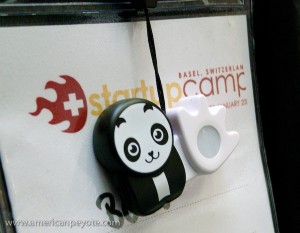 From what I’ve been told, Poken is huge in the Netherlands. It’s a fantastic technology, as long as everyone else has one. When you’re an early adopter it can be a tad lonely. However, it makes you feel like you’re in a special order of internet Geekiness and I like it. Currently Pokens are available in a growing family of cute little animal-like…things, and can bought through the main Poken webpage and an expanding number of stores. I opted for a cute pink girl-type Poken, the others look like cute koala beers, bees, etc. Eventually I’d like a Poken that has an aluminum casing and has a red LED eye like Hal from 2001 (A Space Odyssey), we’ll see what the future brings. Poken has been released in Switzerland, and you can start finding them in stores. Otherwise you can buy them in a set and sell them to your friends. For the moment my cute pink-punk girly Poken can be found hanging out of my jeans or on my keychain.
From what I’ve been told, Poken is huge in the Netherlands. It’s a fantastic technology, as long as everyone else has one. When you’re an early adopter it can be a tad lonely. However, it makes you feel like you’re in a special order of internet Geekiness and I like it. Currently Pokens are available in a growing family of cute little animal-like…things, and can bought through the main Poken webpage and an expanding number of stores. I opted for a cute pink girl-type Poken, the others look like cute koala beers, bees, etc. Eventually I’d like a Poken that has an aluminum casing and has a red LED eye like Hal from 2001 (A Space Odyssey), we’ll see what the future brings. Poken has been released in Switzerland, and you can start finding them in stores. Otherwise you can buy them in a set and sell them to your friends. For the moment my cute pink-punk girly Poken can be found hanging out of my jeans or on my keychain.
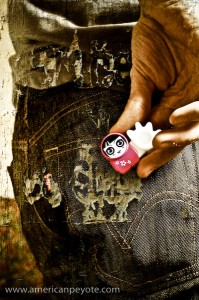 Eventually I’m sure the Poken technology will migrate to other devices like cell phones or something else, which would be sweet (sweet if I had a modern cell phone). So, if you’re looking for a cool little device which lets you keep all your social contacts in one place, Poken could be the perfect product for you. The technology works, it’s simple to use, it’s cool, and it’s addictive. All the elements required for a successful StartUp idea to flourish, and all elements for a successful social internet networking tool seem to be reflected in the Poken design. By the end of the day at the first Swiss StartUp camp, I’m guessing like over half the participants had a Poken and were poking each other whenever possible. The act is truly addictive, as addictive as Facebook, Flickr, etc. is when you’re adding friends online. The thing I love about Poken is that it’s a direct translation of the benefits of social networking into real-life social interaction. I know this sounds a tad aloof but it’s true. Social networking sites like Flickr and Facebook are fantastic for aggregating contact information, but it always exists in the online world. Poken provides the bridge between the technology of online social networking and the real world, and this is one reason why I think Poken can be successful while sites like Facebook risk hitting a popularity peak and then fading into obscurity.
Eventually I’m sure the Poken technology will migrate to other devices like cell phones or something else, which would be sweet (sweet if I had a modern cell phone). So, if you’re looking for a cool little device which lets you keep all your social contacts in one place, Poken could be the perfect product for you. The technology works, it’s simple to use, it’s cool, and it’s addictive. All the elements required for a successful StartUp idea to flourish, and all elements for a successful social internet networking tool seem to be reflected in the Poken design. By the end of the day at the first Swiss StartUp camp, I’m guessing like over half the participants had a Poken and were poking each other whenever possible. The act is truly addictive, as addictive as Facebook, Flickr, etc. is when you’re adding friends online. The thing I love about Poken is that it’s a direct translation of the benefits of social networking into real-life social interaction. I know this sounds a tad aloof but it’s true. Social networking sites like Flickr and Facebook are fantastic for aggregating contact information, but it always exists in the online world. Poken provides the bridge between the technology of online social networking and the real world, and this is one reason why I think Poken can be successful while sites like Facebook risk hitting a popularity peak and then fading into obscurity.
“Give people value, and provide a product/service which solves a problem that they have.”
That was one of the main points I took away from the First Swiss StartUp Camp, and for me Poken fulfills the above statement perfectly.
“So, do you Poken?”